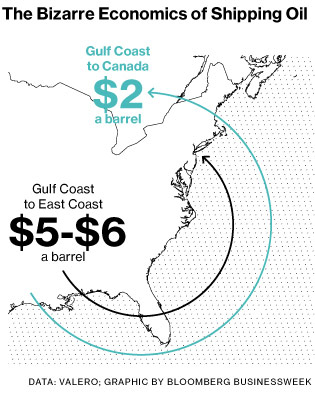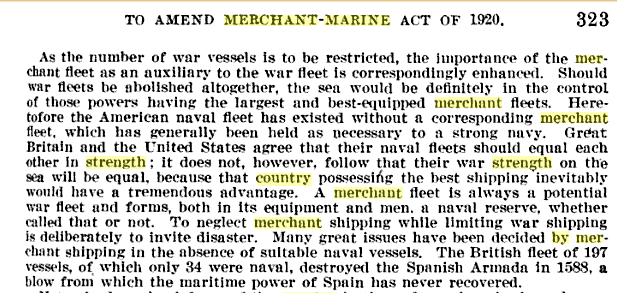I participated in a seminar on the Jones Act of 1920, with good presentations by Phil Magness, Woan Foong Wong, Ken Schoolland, Keli’i Akina, and others. The Jones Act requires that any cargo carried between two US ports be (a) carried only on US-built ships or barges that are (b) mostly manned by US citizens, and (c) that the vessels be owned by US individuals or companies. Predictably, this protectionist measure has increased shipping costs, raised prices for consumers, decreased the competitiveness by US shipbuilding companies, and led to a number of bizarrely expensive and wasteful but common transport occurrences.
For example:
 * Shipping oil from the Gulf Coast to Canada costs $2 per barrel on international ships, but shipping from the Gulf Coast to the US East Coast costs $5-6 on American Jones Act ships.
* Shipping oil from the Gulf Coast to Canada costs $2 per barrel on international ships, but shipping from the Gulf Coast to the US East Coast costs $5-6 on American Jones Act ships.
* After a winter storm, New Jersey faced a rock salt shortage. Officials found 40 tons of rock salt for sale in Maine and a ship available to transport all of it in two days. But the ship was flying a Marshall Islands flag, so it couldn’t be used. Instead the only US-flagged ship available was a barge that could carry only 9.5 tons per trip. So the transporting of the salt took 5 trips over 1 month and an extra $700,000.
* To get its lumber to Seattle, an Alaskan company found it cheaper to ship from Juneau to Seattle via Tokyo on international ships rather than directly from Juneau to Seattle on American ships.
Passed shortly after World War I when national security was strongly in everyone’s mind, the Jones Act is a classic Bootleggers and Baptists phenomenon, with crony businesses able to profit while other supporters fly the flag of national security needs. Yet while no significant national security needs have been met or materialized from the Act, plenty of connected shipbuilding and shipping companies have blocked competition and collected semi-monopoly rents. Industry incumbents make significant campaign contributions to politicians, and those politicians won’t touch the Jones Act.
For more information, here is the Hawaii Shippers Council site on the Jones Act and the Grassroot Institute’s primer on the Jones Act and especially its negative impact on Hawaii.
I’ll follow up soon with a short post on how the Jones Act obstructs emergency aid during, for example, hurricanes and oil spills, when foreign ships in the area are often unable to offer assistance.
